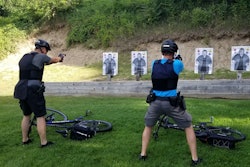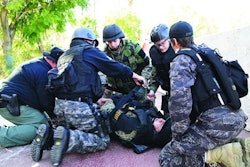When a law enforcement professional contemplates the term "succession planning" the first—and maybe only—thing that comes to mind is, "Who's next in line to be _________________?" This is usually the person or persons perceived by most people in the organization to become the "next" chief, or captain, or line lieutenant.
Consequently, the development of leadership skills has become a very high priority for organizations' long-term strategic plans as well as individuals' personal and professional goals. The agenda of available courses and presentations any major law enforcement conference will include a host of choices for leadership training.
The 10-week FBI National Academy (FBINA) is one of the oldest and most recognized law enforcement leadership programs on the planet. Then there's the eight-day Law Enforcement Supervisors Leadership Training Program offered by the Federal Law Enforcement Training Centers (FLETC) in Glynco, GA; and others.
While it's certainly valuable to have an idea in mind of who might be well-suited to fill those important leadership roles, the notion of succession planning must be applied to every single facet of the department. Who will be the next detective when so-and-so solves their last big case and retires? Who will be the next firearms instructors when fill-in-the blank firearms manufacturer lures your current cadre away for better pay? Who will be the next FTO, the next K-9 handler, the next undercover?
A Culture of Succession
Michael Warren, director of Curriculum and Training with Command Presence Training, believes (and teaches) that the notion of succession planning must be applied to every aspect of policing and every position in the profession. This begins with having a detailed understanding of every role in the agency, and an articulable description of that position.
"We can't identify who that next person is if we don't have a very detailed description of what we're looking for," Warren says. "But if we do have that [detailed description], then we can start to involve people throughout the organization to be on the lookout—for lack of a better term—for those people that are starting to exhibit those skills."
Warren gives the example of being cognizant of the officer who others ask for advice, or who consistently shows up to a situation and becomes the de-facto on-scene commander. They're seen at times parked driver's-side-door to driver's-side-door talking with a colleague about the call they just had, in a manner of informal debriefing, discussing, listening, and learning.
Once the seedling of a skill is seen, it then must be nurtured and grown. This takes effort on everyone's part, but from an organizational standpoint, it requires a willingness to first let people get a preview picture of what may lie on their career horizon.
"Oftentimes people do think they want be a sergeant, for example. They get promoted and being a sergeant isn't what they thought. Give them a peak behind the curtain. Let them see what the job's really got in store. Maybe they just say, 'You know what, this isn't for me.' So we don't go through that entire process and waste a ton of [the agency's] money and waste that person's path."
Warren says that an integral part of this process is actively cultivating a person's professional interests, without indulging fantasies or creating false expectations. For example, when seeking to find the next detective candidates, who are the officers that write the most detailed robbery reports? Who has demonstrated an ability to build conversational rapport with just about any crime victim, witness, or even suspect?
"It's not about nurturing every ambition," Warren says. "It's about nurturing the correct ambitions. It's not just identifying the path. It's also helping people to self-discover what they're passionate about and what they want."
Meanwhile, although it's somewhat counterintuitive, it must be noted that matching a person's love for—or exceptional ability at—a given skill may not necessarily match up with their perception or understanding of how that skill fits with a desired career path.
Just as a top-tier stick-and-rudder pilot may also be a terrible flight instructor, a cop with a lifetime's worth of experience riding horses on a ranch might not be a perfect candidate to head up the agency's mounted unit. It's a matter of having a culture in place that encourages officers to explore the element of law enforcement that's best suited to their skills and abilities, and then providing the tools and training to achieve those goals.
Warren says, "If you love shooting and you're passionate about shooting, then being the firearms instructor may not be for you because oftentimes in agencies, the people who shoot the least are the firearms instructors."
Warren says that it's a matter of mapping a person's gifts and abilities—in combination with their own personal investment in developing those traits—against the needs of the agency, and then providing the ongoing training to get there.
"Realistically in a succession plan, if somebody's on point A and they want get to point B, the agency should provide the roadmap on how to get from point A to point B," Warren says.
"What I've found to be most successful is if we create a program that is spelled out and requires self-investment and investment from the agency," Warren says. "So, for example, if we're talking about someone who has identified leadership characteristics, we'd say, 'Hey, is this something you want do?' and if they do, we say, 'Here's what I would like from you. Here are some great leadership books… from our library. I want you to read them, and we're going to give you a test'."
Warren says that if somebody's willing to invest "their own time and on their own dime" then the agency has buy-in from the individual and can feel more secure in investing in that career development and succession planning process.
Making Strategic Investments
Succession planning should be introduced during recruiting and initial academy training, integrated into in-service training and career development, and influence overall employee retention objectives. Further, it's incumbent upon both the agency and the individual to put in the time and effort to achieve mutually beneficial goals.
Police leaders must recognize the fact that the paths of careers and organizations are not tied to the same timelines. An individual officer knows their career is finite—in the best possible case just two or three decades in duration. But the lifespan of the organization is theoretically infinite—the business of the agency must and will go on after people retire.
Succession planning is a type of investment—almost like an insurance policy—that may seem in the moment to be cumbersome and costly and perhaps even unnecessary, but when the time comes, the return on that investment can (and should) be manifold.
Like any investment, succession planning should be strategic in nature, and hedged against potential risks. An agency stands to lose plenty if the person—and/or persons—in whom they have invested decide to move on to another department or leave the profession altogether.
Given the anti-police rhetoric among many members of the public, the press, and the political elites, this risk is greater now than it's ever been. However, the risk of not being intentional about succession planning is not an option.
















